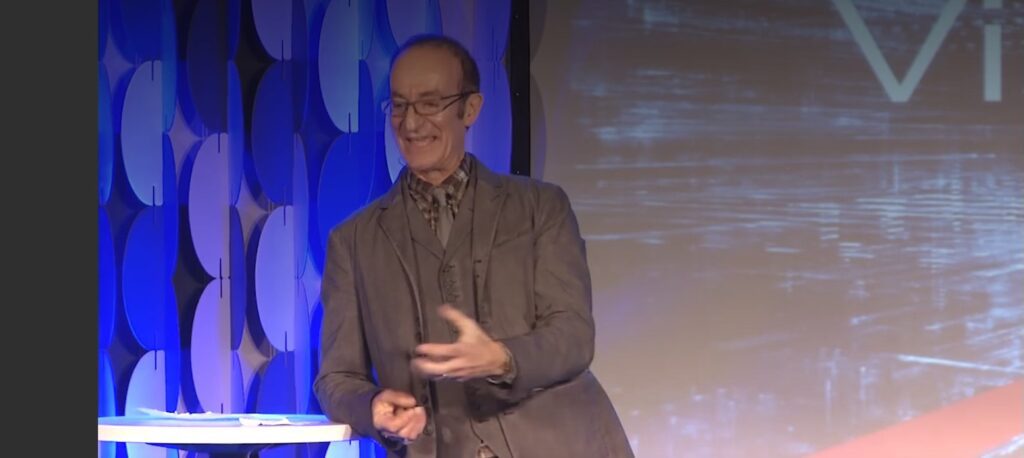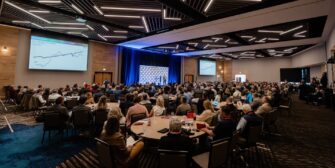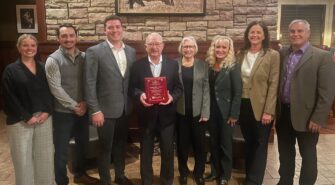Preview a ‘taste’ of family business at one-of-a-kind dinner
Recent News
In business, every day is showtime. But is your performance hitting the mark?
Michael Allosso is the No. 1-rated speaker for Vistage International, the world’s largest CEO-enrichment organization, bringing his 25-plus years as one of the nation’s preeminent communications and self-awareness specialists.
He has worked with CEOs, marketing executives, managers, sales teams, attorneys and many others to communicate effectively in an array of business settings.
And you could be next.
Allosso will be a keynote speaker at the Prairie Family Business Association’s annual conference April 29 and 30.
And he knows what it means to command a stage. His experience as a professional theater and film director enables him to quickly identify strengths and weaknesses in anyone’s communications game.
“Leadership is one of the most requested topics from family business owners,” said Stephanie Larscheid, executive director of the Prairie Family Business Association.
“Michael Allosso will deliver on this topic and more. We are thrilled to present Michael and encourage anyone looking to enhance their leadership and communication skills to join the virtual conference and learn these proven secret weapons.”
We caught up with him for a preview of his speech: “You On Your Best Day.”

The whole title “You On Your Best Day” is intriguing. What do you mean by that? What does that look like in action?
Intentionality. You have to decide what it is you want to do, not only in a day but in your life. What’s your objective in a day? What are you trying to do? And what are you trying to do in life, and how do those reconcile? What I like to do is give you the tools how you personally, with intentionality, can be your best authentic self every day.
For family businesses, what’s so wonderful is the two words are together. One mistake people make is “I’m one thing to my family and one thing in business,” and in family business, people have a leg up on this.
You have a valuable list of “secret weapons” in communication, so without giving too much away, can you share one or two of them? Maybe your favorite or one that might be unexpected?
There are 35 to help you be you on your best day, and when I created them in 2003, there was no intention this would be a marketing tool, but I ended up being a keynote speaker for organizations multiple years in a row to go through different ones because it piques people’s interest.
So for example, one is I believe you have to bring energy to the table every single day, and that energy for you is different from me, but energy is commitment to the moment, and many of the secret weapons flow from that. Secret No. 23 is “This Sentence”: How do I stay in this sentence with you and not worry about what I have just finished or have to do next but stay in this moment?
Many of the secrets overlap in their quest for excellence, but each has its own sparkle and level of accountability — everything from how you give and receive feedback, how your body language creates ideas, how you talk not what you say, how you ask questions, the use of names. They’re all based in acting principles, what a theater person would have needed in their commitment to a role, but this commitment is to the role of leader or mom and dad or life partner.
Some of the trickiest communication in leadership involves giving feedback, and you have a proven approach for that. Can you give us a look into what you suggest?
Feedback is a compound word. What’s the first word? It’s about nurturing and feeding the people who come to us for criticism. We have to give truthful, specific and positive feedback. What I’ve copyrighted is the notion of TSP: truth, specificity and positive thinking. How do we nurture and feed those people who come to us for feedback with that very criticism we give them on a daily basis?
The way we all communicate in business settings has been significantly changed in the past year, with so much going virtual. What guidance do you have for that new environment?
Digital communications require interpersonal awareness and skills which you haven’t had to develop in face-to-face meetings. We used to appear in person and on stage. We are now virtual TV stars. We have been thrown into this new way of working and interacting without any training or preparation.
I’ve been locked down more than 55 weeks, and I’ve done 289 presentations virtually, keynotes and workshops, and the big thing people forget is you’re translating from being theater stars to being film stars. Actors have to learn to do that, and now business leaders have to as well. Any deficiency we have in person gets magnified virtually. If your body language is sloppy in person and not committing to what you say, on the little rectangle I see it. if you’re a nonsmiler on the little rectangle — ouch. If you multitask, it’s as visible as it can be. People think it’s invisible, and it’s not. So every secret weapon gets magnified when you take it virtually. Eye contact — if you don’t look in the camera lens, suddenly you’re not looking at anybody. It’s the same energy as a television or film actor when it comes to an intensity toward the camera lens.
And, of course, many in business are trying to navigate how to present themselves and communicate through social media. Do you have some advice for that universe?
For me, the big problem social media has created is in how we present ourselves when we communicate in a business context. I encourage my clients to make their emails and even their texts more formal. I include a greeting, I write complete sentences, and I have a closing. It makes for more polished communication. If you write an email, a text, a LinkedIn message, it still needs to demonstrate you at your best. And you have a succinct amount of lines to get your message in. It’s more like communicating for the screen than the stage.”
What do you hope people ultimately take away from hearing you speak?
A minimum of two ways to upgrade the way they communicate and lead — at least two ways to enhance their present communication and leadership package.
I believe we as presenters have a responsibility to make it entertaining and informative, and whenever you sacrifice one for the other, you’re making a mistake. My presentation is fun. It’s a good time, and then you take away things. A good presentation is not a monologue; it’s a dialogue. It’s a conversation with the audience. Don’t just listen to what I say. Watch what I do, and your takeaways will be multiplied.”
Thanks to the Prairie Family Business Association conference’s hybrid format, you can access this and all upcoming presentations from anywhere during the event and for the entire month of May. To sign up and learn more, click here.



